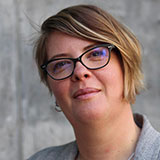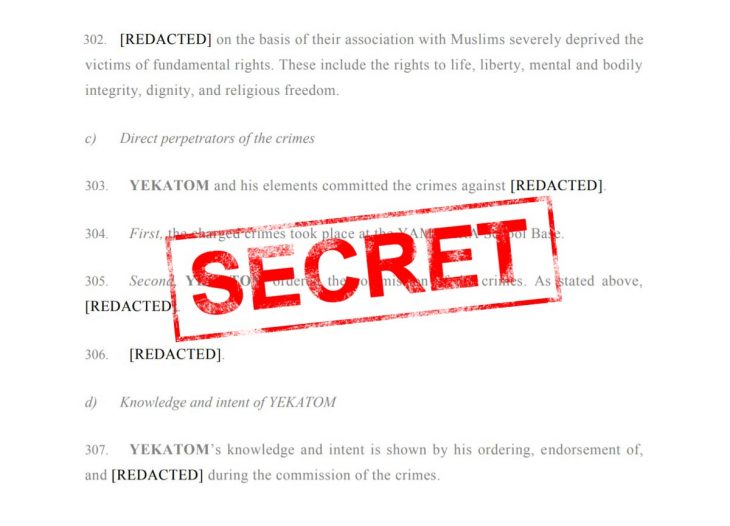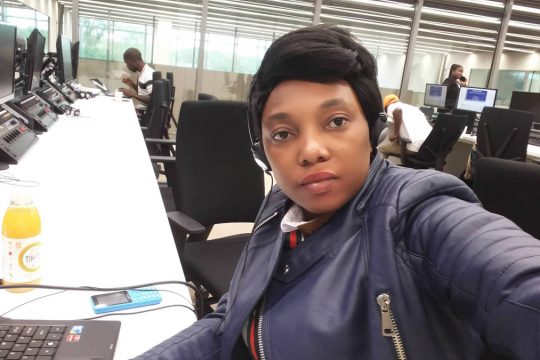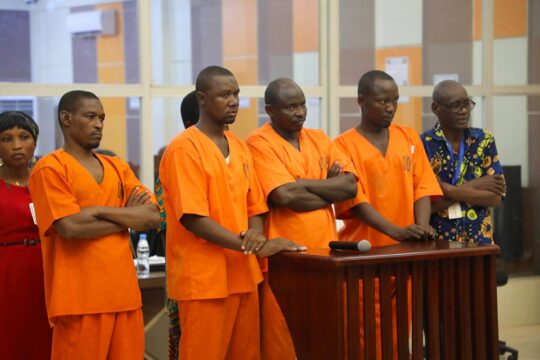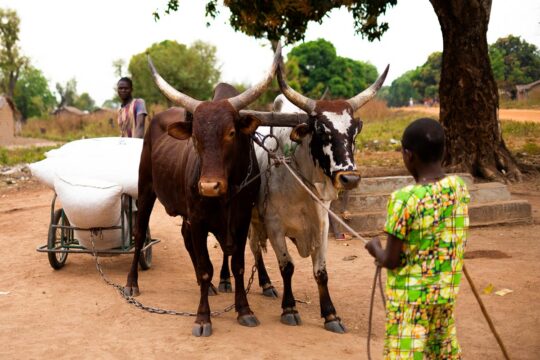One side only of the 2013-2015 Central African Republic (CAR) conflict was in the dock, as many Central African observers pointed out at the confirmation of charges hearing that has ended last Friday in The Hague. In the first minutes of his opening statement, on September 19 at International Criminal Court (ICC), prosecutor Kweku VanderPuye explained that the strife began with the emergence of the Seleka which ultimately overthrew president Francois Bozize in March 2013. The Seleka, a predominantly Muslim political and armed group unleashed a tactic of “scorched earth and terror” said prosecutor VanderPuye. The coup spurred on a counter movement known as “anti-balaka”, whose principally animists fighters wore gris-gris meant to stop Kalashnikov bullets.
Patrice-Edouard Ngaissona was one of their former leader. The prosecutor told judges that he, with the inner circle of Bozize, exploited the hatred and desire for vengeance to set up a fighting force to retake the country. “As Minister of Youth, Sports, Arts and Culture, Mr Ngaïssona wielded authority and influence. He encouraged the youth to take up arms. He mobilised and coordinated groups on the ground. He was wealthy, and he could resource them,” VanderPuye said. “These and other essential contributions helped transform the anti-balaka into a force able to eventually defeat the Seleka regime – but also, and importantly, one capable of committing the charged crimes on the scale and magnitude in which they were perpetrated,” he added. If the alleged charges were to be confirmed by the preliminary chamber, Ngaissona could face up to 111 charges for participating in a plan to target Muslims and helping others to commit crimes including persecution, murder, torture, rape, use of child soldiers and targeting civilians throughout the Western part of the country. The prosecution wants him to be held liable as a direct co-perpetrator in the crimes or as a participant in the common plan under so-called ‘common purpose liability’.
Ngaissona’s co-accused, Alfred Yekatom aka ‘Rambot’, is accused of, as he was commanding an anti-balaka unit, ordering his troops to commit crimes and personally taking part in atrocities against Mulsim civilians in Bangui and in particular in the Boeing area of the capital city and in other areas of southwestern CAR. The two men were arrested and transferred to the ICC about a year ago. Appearing for the first time on the last day of the hearings, on Friday 11 October, chief prosecutor Fatou Bensouda told judges: “The case before you is one of ethnic cleansing”. Following the Seleka “terror”, anti-balaka groups targeted all Muslims, she said. “Muslims, once neighbours, friends, family, sons and daughters of Central African Republic were seen as collaborators, as foreigners”, she summarized.
“Dual-standard justice”
But if the so-called “CAR II” case focuses on crimes by anti-balaka armed groups, much of the attention was on the other side, the predominantly Muslim Seleka militias and their notable absence in The Hague. The ICC has a separate probe into Seleka crimes but no arrest warrants have been issued after five years of investigations. Central African human rights organisations, present at the hearings, said the public in Central Africa is concerned about the seemingly one-sided case. “Today there are only the anti-balaka leaders and mostly for crimes against Muslims who in turn also committed crimes against non-Muslims. This is dual-standard justice,” Mathias Morouba of the Central African Observatory for Human Rights told JusticeInfo.
This situation had a further impact. Because the Seleka investigation is ongoing any findings from it are being kept secret. That was clear during the confirmation of charges hearings which were riddled with sudden closed sessions. Often the microphones where cut off in the middle of a sentence when parties touched on subjects the judges deemed to be confidential. The events in the Seleka and anti-balaka investigations often overlap because the groups were fighting each other and reacting to events on the ground which means the same witnesses and even the same testimony could be relevant to both cases. Defence teams complained about late disclosure and the fact that many witness statements where heavily redacted. The 164-page document containing the charges against the two accused was made available publicly only the evening before the hearings, and only in English, prompting many complaints from French speakers trying to follow the proceedings.
Non-public hearings
The late charges document together with the frequent closed sessions made it hard to follow the case from the public gallery. Usually ICC trials have some closed sessions and a certain amount of redaction of statements, but the frequency and abruptness of the interruptions in this case stood out. “When you have repeated closed sessions. It’s untimely and frustrating. The public will never know the whole truth is what is going on during the hearings,” said Morouba.
The defence team of Yekatom argued the secrecy around the Seleka investigation was affecting their client’s right to a fair trial because accusations cannot be verified, and witnesses’ credibility cannot be checked. “A huge amount of evidence has been kept from us to protect the Seleka investigation,” defence lawyer Mylene Dimitri told judges, asking them to dismiss the 21 charges of war crimes and crimes against humanity against Yekatom. She argued that many of the instances the prosecution labelled as attacks on Muslim civilians could be attacks on Seleka units, but because the prosecution would not reveal findings about witnesses’ possible affiliation with the Seleka that could not be checked. Or they argue for the charges of forcible transfer and displacement that it is impossible to say if civilians fled due to anti-balaka or possibly Seleka militia activity in the same area.
Lawyers for Ngaissona, who was acting as a senior African football executive when he was arrested in Paris, was not masterminding crimes. Instead lawyer Geert Jan Knoops cast Ngaisonna, as a peacemaker who acted as a go-between with the anti-balaka when the transitional government and international forces did not want to engage directly with them.
Local journalists questioned why these two men were singled out for a trial at the ICC. “Ngaissonna was not someone who was really on the ground during the conflict, he became more of a spokesperson,” said Inès Laure N’Gopot of the justice broadcast of Radio Ndeke Luka. Rosmon Zokoue, journalist and blogger, writing about the case (on www.lettimbi.canalblog.com) explained Yekatom, also known as Rambo, was mainly seen as a wartime profiteer, out for himself and not the most influential commander. “From what I heard in court it looks like the prosecution’s case is not very thorough, it seems that they haven’t found good witnesses,” he added.
To confirm the charges against any suspect the ICC judges have to agree that the prosecution presented sufficient evidence to “establish substantial grounds” to believe the suspect committed each of the counts charged. The confirmation of charges hearing in the CAR II case ended Friday October 11. The judges have 60 days to either confirm some or all of the charges that they feel there is enough evidence for and move on towards a trial; decline to confirm the charges and drop the case against one or both accused; or finally adjourn the proceedings and ask the prosecutor for additional evidence.

